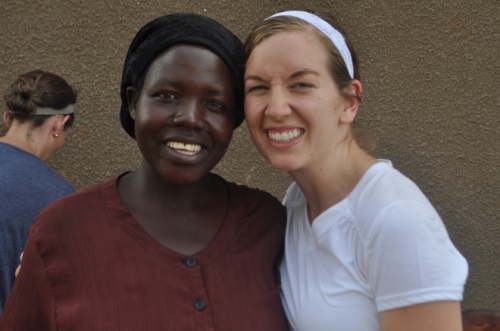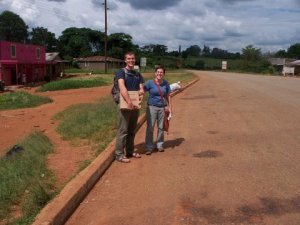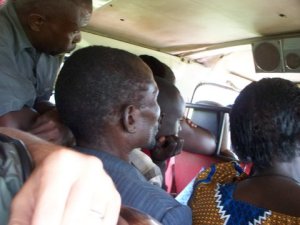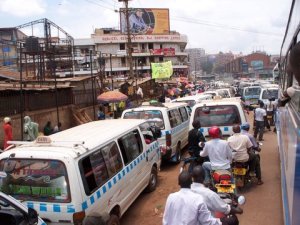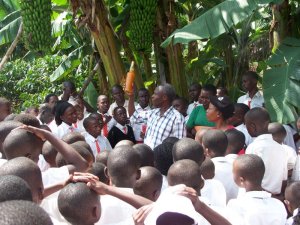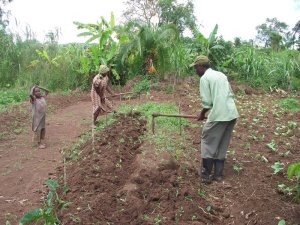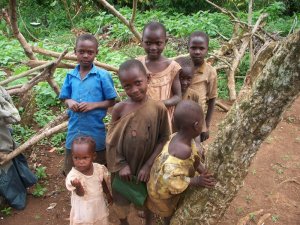View original post 303 more words
We have moved to http://www.embraceuganda.org/blog/. Please make a note of it.
Posted in Embrace Uganda Summer Mission Trips | Leave a Comment »
Dear friends and family,
It has been one year since we left the U.S. to serve in Uganda; full of unforgettable, life-changing experiences and trying challenges. Our time has taught us so much about the Ugandan culture, ourselves, and the countless blessings that God has and continues to shower upon our lives. We have realized – as others had warned – that it takes a full year to get familiar with a culture and to know where we best fit in. We have tried our best to make ourselves useful this past year, and we know that the lessons learned will make our second year all the more fruitful.
Recapping the year, we have been involved in assessing the needs in the communities that Embrace Uganda (EU) supports; completing the construction of a church and latrine in the Eastern village of Koreng that the community hopes to use for vocational training, pastor conferences, hosting volunteers, etc.; distributing funding for scholarships and teachers’ salaries; hosting teams of volunteers from the U.S.; acting as mediators, transferring information and funds, between EU and its Ugandan partners; beginning preparations for the construction of Hope Again Medical Center in Kaihura; and providing computer training, information management solutions, and the like for our partner organization Bringing Hope to the Family (BHTF). Despite the many activities, much of our time in Uganda during the last year has been spent building relationships: with our Ugandan partners, the children, and the communities that we serve together with EU and its supporters. It is this network of relationships that we have enjoyed the most, as well as being able to share our experiences, and the stories of our new-found friends, with all of you in other parts of the world.
Our days are rarely short of challenges, especially facing the realities of abject poverty. Nonetheless, our work here has unquestionably been the most rewarding experience of our lives and will be hard to top. We count ourselves blessed to be in Uganda facilitating and being witnesses to the work of God and so many of His faithful. Your support, prayers, and encouragement have kept us going and made our work in Uganda possible. For this opportunity, we are eternally grateful to you.
This coming year is exciting for us, as we will spend another year in Uganda, but this time with the perspective and the lessons of the past year. Our tasks for the next year will include: coordinating the construction of the building for the Hope Again Medical Center (which is now underway); continuing to act as mediators between EU and its Ugandan partners; continuing to build the capacity of BHTF (through computer training, information management, strengthening the structures of their income-generating projects, etc); establishing clear systems of accountability between EU and its partners; and hosting more teams of volunteers from the U.S. Our hope is that by the end of our two-year commitment, ending in early 2011, our role with BHTF will be completed and we will have helped empower the BHTF staff to continue their unending effort to help the people of Kaihura and surrounding communities.
We write you to thank you for your support in the past year and to ask for your continued support in the year to come. After evaluating the status of our funding thus far, we have found that we need to raise approximately US$6,000.00 to complete our two-year commitment in Uganda and help us resettle back in the U.S. next year. Our reason for asking for increased support is two-fold. Firstly, we hope to increase our monthly financial support after having realized during the past year that what we had estimated was indeed a very tight budget. Secondly, a few of our sponsors, due to uncontrollable financial pressures in their own lives, have not been able to support us to the level that they had hoped. To those of you that fall into this category please know that we understand the situation, are grateful for your intentions, and we often pray for your financial well-being.
We ask for your prayers, and if it is in your heart to sponsor someone, we could definitely use it. Whether you would like to support us with a one-time gift or monthly contributions, you can do so through the donation page at www.embraceuganda.org or by making a check payable to Embrace Uganda at P.O. Box 742, Wake Forest, NC, 27588 – note AJ & Ana Mission Support in the subject line. If you have any questions, please contact us.
We are grateful to all of you that have so diligently supported us, whether financially or in prayer. Your support has constantly given us rejuvenating comfort and strength. We know that God’s body is at work, impacting one life at a time. We surely would not be here if not for each of you.
Thank you!
Until next time . . . much love and many blessings . . . AJ & Ana
Posted in AJ & ANA | Leave a Comment »
Written by Ana on Monday, January 25, 2010
He sat there on his auntie’s lap sucking at the multi-colored, heart-shaped lollipop. His auntie would take the lollipop away from his mouth for him to say a few words and show his mother that he could now talk. Last time that we visited he was not talking yet. We watched him as we sat in the living room of the mud hut. The walls of this home are plastered with mud, the floors are dirt, the roof is made of tin sheets. The family is lucky to have tin sheets as a roof.
The child smiled and left his auntie’s lap to go outside and run around the house. His tiny body with its protruding belly looked cute as he ran away. Watching him run off brought a smile to his mother’s face, as she knew that he was growing strong and developing well. She was reassured that the family was taking care of her son. The mother called out his name from the living room. In this culture, people are given two names, usually a Christian one, and then a second name describing a certain quality, like “joy,” “grace,” “hope,” “courage,” “God’s child,” etc. She called out his second name; it translates to “forgiveness.” Hearing his name, the child came back into the room and was picked up by his mother and sat on her lap. She sat there enjoying the closeness of her child, if only for just a few minutes. She inspected his feet. They looked fine. It seemed that “jiggers” (sand fleas) on the floor of the hut had not really affected his feet. She ran her hand on the skin of her child’s legs. His skin felt well moistened with the Vaseline that the family had put on the child after bathing him upon our arrival to the house. We could still smell the fresh scent of soap that was used on his body. The mother asked him questions in her language, and he responded while sucking on his lollipop with a “mmmh” for yes, or a “mmmh, mmmh” for no. Then the child slid out of her lap and ran out of the hut once more.
We sat there looking at the child playing outside through the opened door. I asked the mother whether her child’s father was at the home at the time. She said yes, and later pointed at a man outside the home who was busy with something. I now cannot remember if it was a chore that he was doing, or if he was talking to someone… my eyes were simply on him, his person, as I asked myself: “Who is this young man, is he a good father?”
The child’s grandfather came into his living room and sat in the armchair across from us. He warmly welcomed the mother and me, the foreigner in his home. I greeted him in his language. He responded with a greeting, followed by other words in Rutooro (the local language) that I could not understand. He asked me if I only knew greetings in Rutooro… I know little besides greetings, so I responded with a simple yes so as to not overcomplicate the matter or start with excuses for why I have been in this community for almost a year without learning much of the language. The mother and the grandfather of the child talked for a short while. She seemed to be telling him how things had been going for her. I could tell that the grandfather congratulated her at some point in the conversation. She must have told him that she passed her primary (elementary) school exams, and that she will soon be starting secondary school (high school). The mother showed the grandfather the pictures of her son that I had given her after we visited the child last time and snapped some photos. She had been carrying the photos in her purse. The grandfather looked at the pictures and smiled. He liked the photos and wanted to keep one. The mother gave him the one that showed the full body of the boy standing handsomely in the yard. He refused that picture, however, on the grounds that he wanted the one with the mother holding the boy in her arms. The mother is smiling beautifully in the picture. It was the only picture that she had of the two of them. Only she and I knew that. She gifted it to the grandfather with a smile.
Our time for the visit seemed to have come to an end. The boy’s aunties and other children escorted us down the path that leads back to Kaihura, where the mother and I both live in comfortable brick homes with cement floors, interior cement ceilings, electricity, and comfortable beds. The mother put her purse straps around her son’s neck for him to carry for her as he escorted us as well. He was happy to carry it and held the straps tightly with his hands as he ran ahead of us with his quick little legs and the energy of a toddler. We watched him run ahead. Perhaps he wanted to go back to Kaihura with his mother? Did he know that this teen-aged girl was his mother? She only bonded with her son for no more than a year before she had to leave him in the hands of his father and grandfather’s family. She has only spent a few hours together with the child since the time that she had to leave him. So, did he recognize her?
Will the child ever know how much his mother cares? That she left him so that she could finish school and become an educated, descent woman so as to give him a better life than her own. That she regrets having had run away with his father, who had promised her the world and instead took away her dignity. That it took a long time for her to realize her full potential, and now that she had, she was putting all her energy into being a great student. That she thanks God that he did not contract HIV from her during his birth, or die days after his birth, as her second child did. That she has every hope to see him grow up to be a strong, descent, and educated man, despite her odds of being an HIV positive woman in Uganda. That it pains her to know that he is growing up without his mother; as she knows what that is like, after having lost her own parents to HIV as a young child. That she wants him to experience the Love of God that has given her hope, despite all that she has gone through, or perhaps because of all that she has gone through. That she wants to give him a future, even though all she can give him for now is a multi-colored, heart-shaped lollipop.
On the walk back to Kaihura this brave young mother told me what the grandfather had told her at the end of their conversation: “go on and study hard.” She intends to do so. The grandfather was the one that gave his grandchild the name “forgiveness.” I only hope that this child can grow up to forgive his parents and a society that has allowed his family to be victims of the cycle of poverty and illness. For now, he is too young and innocent to understand any of these things… This young woman leaves him behind, but with high hopes and her head held high.
We have kept the name of this young mother anonymous in order to protect her privacy, but we thought we should share with you a glimpse into her amazing story. She will be starting her first year of secondary school in just a few weeks after having passed her Primary School standardized exams with scores that surpassed most people’s expectations, especially considering all her setbacks. Her hope now is that she can one day be first in her class in a boarding secondary school in Fort Portal (currently Bringing Hope to the Family is seeking a sponsor to support this young woman in her secondary education). In the future, she hopes to become a nurse. Please pray that God will continue to watch over, provide for, and strengthen her in all of her endeavors.
Until next time . . . many blessings . . . Ana & AJ
Posted in AJ & ANA | Leave a Comment »
It’s hard to believe that it is that time of year already. There are no colorful lights or snow flakes to be seen, no santa’s in the front yard or reindeer on the roof tops, no stocking on the mantle or sub-freezing temperatures – but Christmas is definitely in the air.
The radio stations are playing Christmas carols. Girls who often keep their hair short are pulling together what little they have saved for a nice hair style. The children from Home Again all traveled to Fort Portal for a new shirt and pair of shoes as their Christmas gifts. You can also see the village kids zipping about with unusual excitement.
It is a different feeling from the highly-commercialized event we are used to, and one that distracts significantly less from the true meaning of Christmas. Once again, our experience here keeps bringing us back to the basics. We are excited about the jubilation, rememberance, and love. We thank you for your continued prayers and support, without which we would have long ago returned. We thank you for the difference you have helped us make in 2009 and we only hope that we can multiply the impacts in 2010.
We wish you all a very Merry Christmas and blessed New Year.
May God bless and keep you.
With Love,
AJ & Ana
Visit Embrace Uganda (http://embraceuganda.org) for a special christmas blessing and find out how you can be a part of it.
Posted in AJ & ANA | 2 Comments »
It seems that each time that we have travelled to eastern Uganda, we have come back with a little souvenir: malaria. Last month you probably remember that it got Ana, and this time it got us both. We are both on the mend, but we wanted to ask for your prayers for a quick and full recovery. We are thankful to God for the access that we have had to medical clinics that can test for the parasite, and that we can afford effective medication to treat it.
Even when taking prophylaxis, we were warned that it was a matter of when and not if we would get malaria. We have found that the trick to beating malaria is to know that you have it and starting treatment promptly, giving you a chance to beat the fever within two days, rather than 3 or 4 if your start treatment later. Once you get over the fever, it is a matter of recovering your strength, which can take another 3 to 5 days. So we hope to be all better soon.
This whole experience leaves us thinking about the people in the remote villages of Uganda that have limited access to testing and treatment. Just the thought of walking to the latrine is dreadful when you are in the middle of a fever spike, let alone having to walk miles to the nearest clinic because your life depends on it – like many people do.
Recently, we read a statistic that malaria makes up more than 50% of outpatient visits in Uganda, costing the country 1.3 trillion shillings ($638 million) per year. Just as a reference, there are 33 million people in Uganda. We have come to know that a treatment of malaria tablets costs approximately $10; that is if you don’t end up needing I.V. treatment. A price that is far higher than many can afford… In the end we count ourselves lucky, and we ask you to pray for those that are not so.
We will be in touch soon. Our spirits are high and we are feeling much better already.
Until next time . . . much love and many blessings . . . AJ & Ana
Posted in AJ & ANA | 2 Comments »
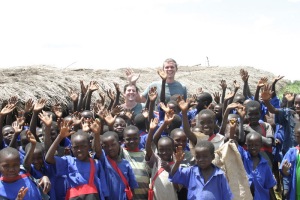 We last visited the Village of Koreng (eastern Uganda) in July, when we were participating in the completion of the construction of the church building that the community hopes to use for classroom space for a vocational school during weekdays. We had shared with you about the drought and famine that the Ateso people were suffering during that time. We returned to Koreng last week to follow-up on the vocational school project and to check on any changes at Kadacar Primary School (an elementary school with every need imaginable).
We last visited the Village of Koreng (eastern Uganda) in July, when we were participating in the completion of the construction of the church building that the community hopes to use for classroom space for a vocational school during weekdays. We had shared with you about the drought and famine that the Ateso people were suffering during that time. We returned to Koreng last week to follow-up on the vocational school project and to check on any changes at Kadacar Primary School (an elementary school with every need imaginable).
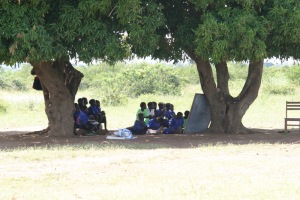 Several things were very different during this visit. For one, the rainy season has started to bring some rain to the area, and some crops are again growing. But also, the very person who first introduced us to Koreng, as his home village – Michael Okwakol – and who has accompanied us on every other visit to Koreng, was not able to join us due to prior engagements. But it was okay, we have been in Koreng frequently enough to have established relationships with several people that have come to see us and love us as Michael’s family – this in itself is a great feeling for us.
Several things were very different during this visit. For one, the rainy season has started to bring some rain to the area, and some crops are again growing. But also, the very person who first introduced us to Koreng, as his home village – Michael Okwakol – and who has accompanied us on every other visit to Koreng, was not able to join us due to prior engagements. But it was okay, we have been in Koreng frequently enough to have established relationships with several people that have come to see us and love us as Michael’s family – this in itself is a great feeling for us.
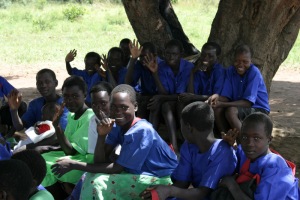 During our first visit to Koreng in March, you may recall that we visited Kadacar Primary School. Since then, extraordinary things have been happening, and we would like to thank all of you for your prayers. Nothing has taught us more about the power of prayer than our experiences here in Uganda.
During our first visit to Koreng in March, you may recall that we visited Kadacar Primary School. Since then, extraordinary things have been happening, and we would like to thank all of you for your prayers. Nothing has taught us more about the power of prayer than our experiences here in Uganda.
To expand a bit on Kadacar’s background, let us recap on our findings from May when we visited the government’s District Education Officer (DEO). During that May visit, we learned that the district is currently working to establish 22 new primary (elementary) schools, and several secondary (middle and high school) and technical schools. The district’s plan is to have a primary school in every parish within the district, and at least one secondary school within each sub county (all of which is only a good start, as many students would still have to walk great distances to attend school). According to the DEO, the cost of building a primary school is US $350,000, which includes 8 classrooms, and associated furniture; 8 teachers’ houses, with corresponding latrines and kitchens; and a well. The DEO explained that the 2009/2010 school budget for Bukedea District (where Koreng is located) is a meager, US $90,000. So, yes, if they had the same $90,000 budget every year, it would take their entire budget for 4 years to build just one school!!
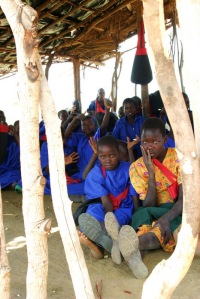 The community is well aware of the government’s inability to offer much assistance in constructing school structures and staff housing, so in Koreng they began working on their own. Kadacar Primary School was inaugurated at the beginning of 2009 as a community effort with 5 classes meeting under grass-thatched school houses and a cluster of mango trees. The instruction has been provided across 5 grades by 5 teachers, 2 of which are unpaid, as the government cannot afford their salaries. Many of the 400 students attending Kadacar are in school for the first time (other schools were not within walking distance for them); something that is evident in the presence of older students mixed in with younger ones in the lower levels.
The community is well aware of the government’s inability to offer much assistance in constructing school structures and staff housing, so in Koreng they began working on their own. Kadacar Primary School was inaugurated at the beginning of 2009 as a community effort with 5 classes meeting under grass-thatched school houses and a cluster of mango trees. The instruction has been provided across 5 grades by 5 teachers, 2 of which are unpaid, as the government cannot afford their salaries. Many of the 400 students attending Kadacar are in school for the first time (other schools were not within walking distance for them); something that is evident in the presence of older students mixed in with younger ones in the lower levels.
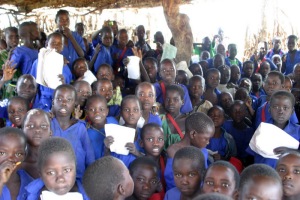 Since learning of the needs at Kadacar, Embrace Uganda has been seeking a way to assist the school. The first step came in June, when a team of volunteers from North Carolina spent a day at Kadacar P.S. playing games and sports with the students. The volunteers also brought school bags containing school supplies for every student. We returned to Kadacar last week to see that many of the students were still carrying their school bags, keeping them close by their sides. Three out of the four classrooms still stand, as one of the classrooms had collapsed during a June storm. A second classroom is on its way down and will probably collapse with this month’s rains. Many students had stopped coming to school because of the inconsistency with which the volunteer teachers were showing up to teach. The government has been unable to pay the salaries of two teachers; “maybe next year,” said the government officials. The community was not able to afford a contribution to salaries because the drought put an incredible strain on every person’s livelihood. We were glad to hear from the school administrator that attendance is back up as compared to recent months, when the drought conditions were so bad that few students were attending school.
Since learning of the needs at Kadacar, Embrace Uganda has been seeking a way to assist the school. The first step came in June, when a team of volunteers from North Carolina spent a day at Kadacar P.S. playing games and sports with the students. The volunteers also brought school bags containing school supplies for every student. We returned to Kadacar last week to see that many of the students were still carrying their school bags, keeping them close by their sides. Three out of the four classrooms still stand, as one of the classrooms had collapsed during a June storm. A second classroom is on its way down and will probably collapse with this month’s rains. Many students had stopped coming to school because of the inconsistency with which the volunteer teachers were showing up to teach. The government has been unable to pay the salaries of two teachers; “maybe next year,” said the government officials. The community was not able to afford a contribution to salaries because the drought put an incredible strain on every person’s livelihood. We were glad to hear from the school administrator that attendance is back up as compared to recent months, when the drought conditions were so bad that few students were attending school.
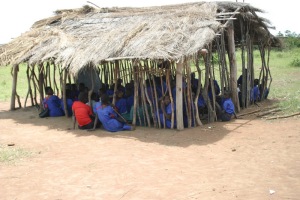 We had returned to Kadacar last week to inform the principal that EU had raised the money to erect latrines for the school (they currently have one temporary latrine for all students, and it is about to collapse). Much to our excitement, we learned that there is another non-governmental organization (NGO) that went to the district with the interest of building a school. The government officials directed them to Kadacar. And, guess what? Very soon they will begin the construction of 4 classroom blocks and 10 latrine stalls on these very school grounds!!! PRAISE THE LORD! Again, those of you who have been praying for Kadacar and Koreng in general, THANK YOU!!! We could not have been more excited. All this time we have been asking for your prayers, as we have prayed ourselves, for help to come to this area of Uganda. Help has reached this place, and it means so much to us… we can’t imagine how much it must mean to the community.
We had returned to Kadacar last week to inform the principal that EU had raised the money to erect latrines for the school (they currently have one temporary latrine for all students, and it is about to collapse). Much to our excitement, we learned that there is another non-governmental organization (NGO) that went to the district with the interest of building a school. The government officials directed them to Kadacar. And, guess what? Very soon they will begin the construction of 4 classroom blocks and 10 latrine stalls on these very school grounds!!! PRAISE THE LORD! Again, those of you who have been praying for Kadacar and Koreng in general, THANK YOU!!! We could not have been more excited. All this time we have been asking for your prayers, as we have prayed ourselves, for help to come to this area of Uganda. Help has reached this place, and it means so much to us… we can’t imagine how much it must mean to the community.
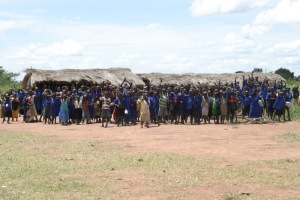 Having learned of this great news, EU is turning back to the vocational school project at the church. We will be returning to Koreng soon to participate in building two latrine stalls and two bathing stalls on the church grounds with the hope that the funds for the vocational school, and other projects in Koreng, will continue to flow in. There will also be a bit of money available to pay for the two Kadacar P.S. teachers’ salaries for the remainder of this year.
Having learned of this great news, EU is turning back to the vocational school project at the church. We will be returning to Koreng soon to participate in building two latrine stalls and two bathing stalls on the church grounds with the hope that the funds for the vocational school, and other projects in Koreng, will continue to flow in. There will also be a bit of money available to pay for the two Kadacar P.S. teachers’ salaries for the remainder of this year.
Much else is still needed at Kadacar P.S., as well as the vocational school, but the rain has come, spirits have been lifted, and we will continue to pray and praise God for his blessings, now more fervently than ever!
Until next time . . . much love . . . AJ & Ana
Posted in AJ & ANA | 1 Comment »
We bumped into Mama Grace in Kampala recently and she gave us this note that she had written some time back. A tribute to the teams and the work that they had done at Agape Children’s Village. This is what she wrote.
A Story About Embrace Uganda
By “Mama Grace”
Dawn, 19th June 2009: D-Day. Agape Children’s Village is “on fire.” Everyone was up by 6:00 am cleaning up everywhere (i.e. around the houses, and also cleaning and organizing the rooms and beds for the Embrace Uganda visitors). It was a busy day because from cleaning, we started preparing the visitors’ dinner. We were really excited because we were going to receive visitors who were even going to stay with us. Because not all visitors sleep in ACV, they would be one of a kind. We waited for them anxiously; since they were arriving in the evening, the hours seemed to be years.
At last, evening came and they here were our visitors. Thanks to God they arrived safely. We had a brief talk and introduction with them telling them about the Children’s Village and were divided into four different groups according to the houses. Personally I was happy and my mouth was agape. We received 28 visitors, and my house, that is “Sharon’s House” or “House 2,” received 8 of them (Harold and Martha, AJ2, Quindell, Evan, Katie, and Katlyn).
Guess what?? All the visitors were so friendly and happy to be with us. “Thumbs up for Embrace Uganda,” I said to myself. It was so amazing to see [people] of different age groups working and cooperating together. I was so much humbled to see such people committed to serve God’s people. More special [was] the elder couple Harold and Martha. I was impressed and amazed by them, how sweet they were to me. Always organized and committed to serve the Lord. I am humbled by their sacrificial love for other people. I am reminded by Psalm 71. Please, please, read it. It was really great seeing and meeting people who serve God together regardless of their age differences. It was really a great pleasure for us to host the EU team in ACV.
The team did really a great job towards Agape Nursery and Primary School. The cementing, plastering, and painting of the school they did were a great contribution towards the development of the school. The classrooms are no longer dusty, no jiggers and cold; hence the children no longer go back home with dirty uniforms and dusty shoes. Oh my!! What about bags, books, pencils, erasers, and pens. Our children were very happy with those things. They no longer lose books because they have bags!!!!
Back to Agape Children’s Village, the children up to date talk about Embrace Uganda. They enjoyed your stay with us. They say they will never forget you for the fun, nice meals, friendship, sleeping in their bedrooms, sharing together, etc!!!!! Some of them remember and cry.
A very big thank you to Embrace Uganda. You really embraced us with love as God embraces us with His loving arms. Your name “Embrace Uganda” is REAL. May God truly bless the Embrace Uganda team. We really had a good time with them during their stay with us.
And oh!! My God… the sad moment came when they were leaving. I even don’t want to remember it. And as it is said, all good things come to an end, so sadly we had to say good bye to the EU team on the 25th June 2009 as they left Agape Children’s Village territory.
However, what keeps us strong are the precious memories we have about Embrace Uganda. The proof is this short account because you will all know what they say “of good things we don’t say much, they speak for themselves in the impact they have.”
Lastly, I am reminded of Hebrews 6:10, that God is not unfair. He will not forget the work you did or love you showed for Him in the help you gave and are still giving to your fellow Christians.
Yours, Love Mama Grace Kajoina Agape Children’s Village P.O. Box 7611 Kampala, UgandaPosted in Embrace Uganda Summer Mission Trips | 1 Comment »
The book “Ministering Cross-Culturally” talks about the two types of cultures: those that are time-oriented and those that are event-oriented. The Ugandan concept of time stands in stark contrast to the fast-paced, time-oriented western cultures. In the event-oriented Ugandan culture, what matter is not the time at which an event takes place, but rather that the event takes place at all. Now, of course there are exceptions to this rule, allowing room for timely Ugandans; who often admit that this time issue hinders productivity in the work place. However, the vast majority of people here just go with the flow and it seems that the “art of waiting” is innate in every Ugandan. Being deeply immersed in this event-oriented culture, we have learned to be content after having accomplished only a single event in one day. So any day that we complete two events on the same day, we praise the Lord; and when it is three or more events, well, we begin to question whether Jesus’ second coming is near. 🙂
To give you an example, traveling from Kaihura to the nearest city of Fort Portal (40 Km away) for a certain purpose (like grocery shopping, banking, paying our internet bill, going to church, etc) and coming back to Kaihura, could easily qualify as an event. By the time you wait from 5 minutes to an hour for a taxi, get on it, wait for it to stop between 5 & 10 times, run your errands in Fort Portal, do the taxi thing again, and make it home, a significant portion of the day has gone.
This past week, we stood at the “taxi stage” waiting for a taxi bound for Fort Portal. As the taxi rounded the bend at the east end of Kaihura town, we flagged it hoping not to receive the flickering lights indicating that the van is full. Now, we usually have a different definition of “full” from that of the Ugandan taxi driver and conductor. That is because these taxis are either 14-passenger vans that usually travel with 20 to 26 passengers or 4 passenger, 4-door sedan cars that may fit up to 8 passengers.
We have discovered that it is true what we read once about Ugandans having little sense of “personal space” as compared to a westerner. This can be observed in that the locals are not all that bothered by having to almost sit on top of a stranger in a taxi. Also, when waiting in line for anything you better get close to the person in front of you or someone will fill the gap for you by cutting in line.Back at the taxi stage – we received the unwelcome flickering lights. What are the odds? (the taxi van must have had 27 people in it). After another 20 minutes, a second taxi rounded the corner, except this time it was a 4-passenger, 4-door sedan. AJ climbed in the back with the already seated 3 adult passengers, and Ana joined a lady in the passenger seat for the 45-minute ride to Fort Portal. Just when we thought that it would not be possible to fit another adult in the vehicle, the car pulled over just a few kilometers from Kaihura. A man needed a ride and the only spot where he would fit was in the driver’s seat… yes, with the driver!!! Did we mention that the man was very tall? No problem though, the driver shifted gears, reaching over the man’s legs that were stuck right there along with the driver’s, somewhere between the clutch and the break. When we arrived in Fort Portal, AJ stumbled out of the car with his right leg completely num. It was an entertaining sight.
Coming back from Fort Portal that same day, we waited inside a taxi van for about 45 minutes for the van to fill up in Fort Portal; 20 minutes of which were spent waiting for the last passenger: Passenger #25. Now, we westerners may think: “Well, aren’t they losing money by waiting so long for only one passenger’s 50-cent fare?” …Yeah, we think so too… and we thought about it as we waited in the hot, crowded taxi. The interesting thing, though, is that not one single passenger would say anything to the conductor and driver until the very last minute. We are all too familiar with the Rutooro phrase: “Tu genda” (for “let’s go”), but no one was saying these magic words! Now, if none of the other passengers felt like saying it, what would give us, “muzungu” (white people), the right to say it? We must also point out that the conductors are so incredibly rude, and in need of a physics lesson. They often insist a passenger to “extend;” which is an ironic way to ask a person to compress into a non-existent space to let one more person squeeze in next to them. We can’t help but wonder if the passengers don’t feel like it is a bit unjust for them to have to delay so much to ride in a very crowded vehicle, when they have paid full price for a seat that they may be sharing with one or two people… One of these days Ana may just start a riot in one of these taxis, when she gets people to yell at the conductor: “No, we cannot ‘extend’ anymore, TU GENDA!”
In Kampala, things are different. It is common for taxi’s to move about with the intended 14-15 passengers. Faith (our host and the executive director of our partnering organization Bringing Hope to the Family) explained to us that the truth is that people in Kampala just do not put up with the conductors that want you to “extend,” but that passengers may very well toss the conductor guy out of the taxi if he starts insisting. Over here, in the more rural Uganda, Faith explains that there is no need for complaining, because the passenger may just be the one kicked out of the taxi… Perhaps transport is one more thing that is bound to the rules of supply and demand, and the people running the taxis can abuse the fact that there are more passengers than there are taxis in the rural areas. Perhaps it may be fueled by police often receiving bribes when they stop a vehicle that carries more passengers than it is suppose to fit, as opposed to fining the taxi. Faith says that things in the rural areas may change as people get exposed to other things, as more jobs become available, and as people become more educated. She says that as these things change, people will learn to “put up” with less, because there will be a larger need to be timely, and because they may simply know better. We really don’t know what governs the rules of transportation, but we are left to ponder on these during our “downtime” waiting for taxis and buses to take us to our destination.
By now, you may be feeling sorry for us, but the truth is that the hours spent waiting by the taxi stage have been a blessing. Numerous times, for example, Bringing Hope to the Family staff members have come out to the taxi stage to ask where we are headed, to keep us company, and they have often flagged down strangers for us to jump into their cars and give us a ride (something safe and acceptable here). We have also enjoyed establishing and furthering countless relationships while waiting and moving by public means. We have met doctors, nurses, other missionaries, and many, many Ugandans – and they all have a story to tell. We have grown accustomed to the public means of transport, and although they can be hot and cramped at times, God is continuing to teach us the “art of waiting” as a means to help us slow down and value the more important things in life, like relationships.
We hope that all of you back home know how much we love and value our relationships with each of you.
Until next time . . . much love and many blessings . . . AJ & Ana
Posted in Embrace Uganda Summer Mission Trips | 2 Comments »
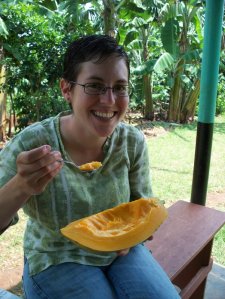 We have always liked the idea of growing food and living from the land, and have wanted to try our hand at farming or should we begin with gardening.We have even started a garden here, but well tell you about that another time Through the time we have spent with Anthony, we have learned that he is an exceptionally well-trained and experienced farmer. Having expressed our personal interest in his field, he takes every opportunity to bring us along when he is teaching others. We have been to the village of Kyongera, located 4 miles north of Kaihura, with him on several occasions. This comparatively undeveloped village makes Kaihura seem like a metropolis. In conjunction with another one of its global partners, BHTF has started a sustainable-livelihoods program with 17 families in Kyongera to assist them in sustainably supporting themselves. All of these families care for orphaned and vulnerable children (those with only one parent). Through this program, each family has been provided an improved variety of matooke (a type of banana tree that produces bananas that people commonly cook) suckers, pineapples, passion fruit, goats or chickens, garden tools, and training in improved agricultural techniques, provided by Anthony.
We have always liked the idea of growing food and living from the land, and have wanted to try our hand at farming or should we begin with gardening.We have even started a garden here, but well tell you about that another time Through the time we have spent with Anthony, we have learned that he is an exceptionally well-trained and experienced farmer. Having expressed our personal interest in his field, he takes every opportunity to bring us along when he is teaching others. We have been to the village of Kyongera, located 4 miles north of Kaihura, with him on several occasions. This comparatively undeveloped village makes Kaihura seem like a metropolis. In conjunction with another one of its global partners, BHTF has started a sustainable-livelihoods program with 17 families in Kyongera to assist them in sustainably supporting themselves. All of these families care for orphaned and vulnerable children (those with only one parent). Through this program, each family has been provided an improved variety of matooke (a type of banana tree that produces bananas that people commonly cook) suckers, pineapples, passion fruit, goats or chickens, garden tools, and training in improved agricultural techniques, provided by Anthony.
These families are very grateful and encouraged by this program. We do not believe that these people have ever seen the level of care and follow-up that Anthony has showed them. We believe that this initiative will go a long way in supporting each one of the families involved. The crops will provide a source of income and food that they did not have before. They will no longer fully rely on outside help (such as the help that BHTF has been giving the children of these families in the form of scholastic materials, school fees, and/or medical care). Perhaps it will help them take the next step.
We were at Anthonys farm last Friday because he invited us to see the program that he was teaching to a group of about 100 students from an elementary school in Kampala. We are always awed by how well-kept Anthonys farm is. The banana trees are so huge that they make you feel like one of Gulliver Travels Lilliputians! The program was great, but even greater was the fellowship that we always share with Anthony, and last Fridays was no exception. He was telling us about how touched he is whenever he sees volunteers like us and many others that pass through Kaihura. He explained to us that many Ugandans do not have a spirit of giving. In fact, he told us that there is a phrase on the Ugandan coat of arms that says For God and my Country. Anthony says that many people jokingly modify the phrase to say: For God and my stomach. But he went on to explain that volunteers from all over the world were teaching what giving really means in Uganda. So he is encouraged by the example that volunteers give, often travelling half way around the world to give of themselves and their resources.Anthony described to us how a few years ago, volunteers with Global Support Mission were helping dig a hole for a shallow well at his farm. A small group of American volunteers were inside a 5-foot hole, knee-deep in mud, scooping out buckets full of mud. This greatly impacted Anthony. He says about the days when he is out there making follow-up visits to families in Kyongera (allow us to paraphrase): When I am out there on long walks under the sun I think of what those volunteers did for me, and I say to myself that I must keep going and help someone else. There are some things that money cant pay [] but we receive our reward in other ways [] Like the days when it doesnt rain until the minute after I arrive at home from Kyongera, and other instances like that; that is when I know that God is looking kindly on what I am doing
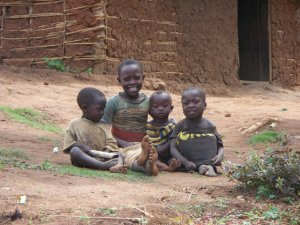 We cant help but wonder if the volunteers that dug the hole that day know the long-lasting impact that they are having in Kyongera through Anthony. We also wonder what Anthonys example is teaching those in Kyongera. BHTF is currently looking for funding to expand the program in Kyongera to include additional families, or even expand to other communities. For less than USD $200 a needy family can receive the items, seeds, suckers, and training that they need to make their livelihoods better and more sustainable, while they give of their land and labor. Ideally, when expanding the program some of the people that have been trained will be willing to train others in what they have been taught. Perhaps they will have taken away, not just improved agricultural techniques, but also Anthonys spirit of service.
We cant help but wonder if the volunteers that dug the hole that day know the long-lasting impact that they are having in Kyongera through Anthony. We also wonder what Anthonys example is teaching those in Kyongera. BHTF is currently looking for funding to expand the program in Kyongera to include additional families, or even expand to other communities. For less than USD $200 a needy family can receive the items, seeds, suckers, and training that they need to make their livelihoods better and more sustainable, while they give of their land and labor. Ideally, when expanding the program some of the people that have been trained will be willing to train others in what they have been taught. Perhaps they will have taken away, not just improved agricultural techniques, but also Anthonys spirit of service.
AJ & ANA
Posted in AJ & ANA | 1 Comment »
